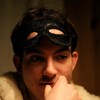
Advertisement
Advertisement

When we met at her apartment she was dressed like a society matron—black dress shirt, silver necklace, and (of course) her iconic red glasses—but had the blunt speaking style of a construction worker or old-timey newspaperman.
Advertisement


Advertisement
Advertisement
Advertisement

Advertisement

